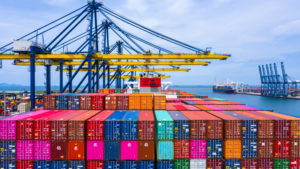April 12, 2022
Putin’s War with Ukraine: Voices of CNS Experts on the Russian Invasion

On 25 March 2022, the James Martin Center for Nonproliferation Studies (CNS) organized a dialogue on export controls in the context of Russia’s invasion of Ukraine. The purpose of this dialogue was to share developments on export controls adopted in the wake of Russia’s invasion of Ukraine as well as to discuss practical opportunities and challenges associated with their implementations.
Participants noted the unprecedented nature of the sanctions imposed on Russia. At the time of the event, the US had designated more than six hundred entities. The EU had imposed five rounds of sanctions. The UK had adopted legislation to implement sanctions. And additional measures were anticipated. Such was the scope of the measures that governmental participants were keen to highlight that the sanctions are not intended to prevent all trade with Russia. In many cases, licensing requirements are being used to mitigate the impact of sanctions. In the case of medicine, for example, exceptions and general licensing was in place to ensure that the Russian population can still access medicines.
The focus of the event was to promote dialogue and discussion between the government and the private sector. The discussion covered substantial ground. Some key points from the discussion include:
1. A general industry retreat from Russia
Numerous participants highlighted ways in which industry was withdrawing from Russia. Industrial participants highlighted the broad scope of their wind-down in Russia-related business. The general view expressed was that most companies were not looking to continue to operate in Russia. There is understanding and acceptance amongst seniors in industry that Russia’s action must be countered. Additionally, companies expressed the view that the Russian market would be too complex to work in and that civil society pressure has anyway been instrumental in getting companies to pull out of the Russian market. Some companies are nonetheless concerned to protect and support their Russian-based workforces. Some companies also explained that removing physical assets, such as machinery, is a lot harder to manage under current conditions than withdrawing employees.
2. Concern regarding medical shipments to Russia
Numerous companies operating in the medical sphere expressed concern about the ability to ship medicines to Russia. While such shipments should be facilitated through the sanctions regime, there was a view that currency devaluation combined with financial sector de-risking had made it all but impossible to ship medicines to Russia. It was recognized that sanctions could be counterproductive if they interfere with shipments of medicine so the need for work with the financial sector to prevent de-risking was highlighted. It was also noted that shoring up the exemptions process for medicine and other medical goods will be important to prevent western nations from being vilified as denying access to lifesaving medicines.
3. Private sector compliance
When the private sector has clarity on the purpose of the controls it magnifies the willingness and ability to comply with them. Rarely are scenarios so extreme, however, in terms of motivation for the private sector, the intent of these regulations is understood from their inception. Participants from the private sector also shared that management is taking more of an interest in compliance efforts, likely due to the reputational risks factors and peer pressure from civil society.
4. Longer-term implications
Participants highlighted that many of the measures are likely to remain in force in the medium to long term. For example, several US sanctions use Congressional authorizations that could require Congressional action to lift. Furthermore, the export control measures are specifically intended to denigrate Russia’s military capabilities in the long term. Overall, the general sense was that many of the measures are likely to remain in place for the long term even when the conflict in Ukraine ends.
5. Unprecedented international coordination
A key theme returned to several times during the event was the unprecedented international coordination on the adoption of controls and sanctions. More than 30 countries had moved almost overnight to impose controls. In some cases, laws were quickly adopted to facilitate implementation. In some cases, such as with military end use controls, many countries worked to address gaps in their export control implementation.
6. A new export control regime?
While it was not a central focus of the discussion, some participants raised the question of how Russia’s invasion of Ukraine would affect the future of export control arrangements. Some asked whether new export control regimes might be created and whether Russia could remain in export control arrangements such as the Wassenaar Arrangement. There was no conclusion to these questions, but it was clear that Russia’s invasion will have important ramifications for the future of export controls.
There was general consensus that the dialogue was timely and useful. CNS undertook to try to organize further dialogues in the future.
